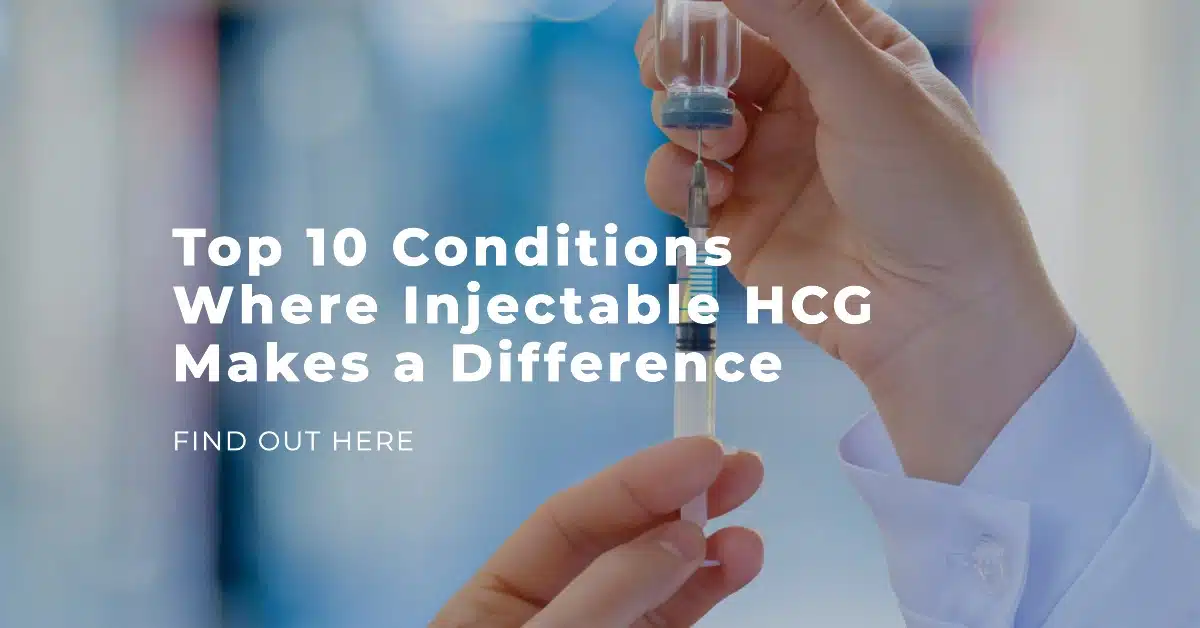Testosterone Replacement Therapy (TRT) has become increasingly popular for men struggling with low testosterone levels. But for those dreaming of fatherhood, a crucial question arises: Can men on TRT still have children? Let’s dive into the complex relationship between TRT and male fertility.
Before we delve deeper, here are some eye-opening facts about TRT and fertility:
- TRT can significantly decrease sperm count and quality, potentially causing infertility in some men. (Source)
- After stopping TRT, sperm production typically recovers in 64-84% of men, with a median recovery time of about 110 days. (Source)
- Supplementing TRT with human chorionic gonadotropin (hCG) can help maintain sperm production in some men. (Source)
Now, let’s explore the intricate world of TRT and its impact on male fertility.
How Does TRT Affect Fertility?
What is TRT and How is it Used?
Testosterone Replacement Therapy is a medical treatment used to boost testosterone levels in men with hypogonadism or other conditions causing low testosterone. It’s administered through various methods, including injections, gels, patches, or pellets.
TRT can help alleviate symptoms of low testosterone, such as:
- Decreased libido
- Fatigue
- Mood changes
- Reduced muscle mass
- Increased body fat
However, while TRT can improve quality of life for many men, it’s not without its drawbacks – especially when it comes to fertility.
How Does TRT Impact Sperm Count?
TRT’s effect on sperm count is a double-edged sword. While testosterone is crucial for sperm production, exogenous testosterone (from external sources) can actually suppress natural production.
Here’s how it works:
- Hormonal Disruption: TRT disrupts the delicate balance of the hypothalamic-pituitary-gonadal (HPG) axis. This complex system regulates testosterone and sperm production.
- Negative Feedback Loop: The excess testosterone from TRT signals the body to shut down its own production of crucial hormones like luteinizing hormone (LH) and follicle-stimulating hormone (FSH).
- Spermatogenesis Suppression: LH and FSH are essential for spermatogenesis (sperm production). Their suppression can lead to a significant decrease in sperm count and quality.
Impact of Different TRT Methods on Fertility
This chart illustrates the average sperm count reduction for different Testosterone Replacement Therapy (TRT) methods.
Sources:
1. Crosnoe LE, et al. “Exogenous testosterone: a preventable cause of male infertility.” Transl Androl Urol. 2013;2(2):106-113.
2. Rahnema CD, et al. “Anabolic steroid-induced hypogonadism: diagnosis and treatment.” Fertil Steril. 2014;101(5):1271-1279.

Can TRT Cause Infertility?
Yes, TRT can cause infertility in some men. The suppression of natural testosterone production and the resulting decrease in sperm count can make it difficult or impossible to conceive.
However, it’s important to note that:
- The effects are often reversible
- The extent of impact varies among individuals
- There are strategies to maintain fertility while on TRT
Common Concerns for Men on TRT Regarding Fertility
Can You Still Father a Child If You’re Taking Testosterone Injections?
If you’re on testosterone injections, getting your partner pregnant becomes more challenging, but it’s not impossible. TRT, including injections, can significantly lower your sperm count and quality. This reduction in fertility can make achieving pregnancy much more difficult.
If you’re hoping to father a child while on TRT, consider these crucial steps:
- Discuss pregnancy and fertility concerns with your healthcare provider
- Explore alternative treatments or fertility preservation methods
- Be prepared for a potential waiting period, as it may take time for your fertility to return after stopping TRT
Regular check-ups and semen analyses can help you understand your personal situation and your chances of getting your partner pregnant while on TRT.
Should You Stop TRT to Preserve Fertility?
If you’re planning to have children in the near future, stopping TRT might be necessary. However, this decision should be made in consultation with a healthcare provider, considering factors like:
- Your overall health
- Severity of low testosterone symptoms
- Timeline for family planning
- Availability of alternative treatments
Remember, discontinuing TRT can lead to a return of low testosterone symptoms, so it’s essential to weigh the pros and cons carefully.
What Are the Symptoms of Low Testosterone?
Understanding the symptoms of low testosterone can help you make informed decisions about treatment and fertility. Common signs include:
- Reduced sex drive
- Erectile dysfunction
- Decreased muscle mass and strength
- Increased body fat
- Fatigue and low energy
- Mood changes, including irritability or depression
- Decreased bone density
- Hair loss
If you’re experiencing these symptoms, it’s important to consult with a healthcare provider for proper diagnosis and treatment options.
Managing Fertility for Men Who Take Testosterone
How to Maintain Fertility on TRT?
For men who need TRT but also want to preserve their fertility, there are several strategies:
- Add hCG: Human chorionic gonadotropin (hCG) can be used alongside TRT to stimulate natural testosterone production and maintain sperm production.
- Use Clomiphene Citrate: This medication can increase endogenous testosterone production and preserve sperm counts.
- Consider Micro-dosing: Some doctors recommend using smaller, more frequent doses of testosterone to minimize the impact on fertility.
- Regular Monitoring: Frequent semen analysis and hormone level checks can help catch and address any fertility issues early.
Are There Fertility Treatments for Men on TRT?
Yes, there are several fertility treatments available for men on TRT:
- Sperm Banking: Freezing sperm before starting TRT can preserve fertility options.
- IVF and ICSI: These assisted reproductive technologies can help achieve pregnancy even with low sperm counts.
- Hormone Therapy: Medications like hCG or FSH can be used to stimulate sperm production.
- Surgical Sperm Retrieval: In cases of very low sperm count, sperm can be surgically extracted for use in IVF.
Can Low Testosterone Be Treated Without Affecting Fertility?
Yes, there are alternative treatments for low testosterone that may have less impact on fertility:
- Clomiphene Citrate: This estrogen receptor modulator can increase natural testosterone production without suppressing sperm production.
- Anastrozole: An aromatase inhibitor that can boost testosterone levels by reducing its conversion to estrogen.
- Lifestyle Changes: Improving diet, exercise, sleep, and stress management can naturally boost testosterone levels.
- Addressing Underlying Conditions: Treating conditions like obesity, diabetes, or sleep apnea can help improve testosterone levels.
Impact of TRT on Sperm Production and Male Fertility
How Does Testosterone Replacement Therapy Affect Sperm Production?
TRT’s impact on sperm production is primarily due to its effect on the HPG axis:
- Suppression of Gonadotropins: TRT reduces the production of LH and FSH, which are crucial for sperm production.
- Testicular Atrophy: Long-term TRT can lead to shrinkage of the testicles and reduced sperm production capacity.
- Altered Sperm Parameters: TRT can affect sperm count, motility, and morphology.
Does TRT Affect Testosterone Levels and Fertility?
While TRT increases overall testosterone levels in the body, it paradoxically decreases natural testosterone production in the testes. This localized decrease in testosterone can negatively impact sperm production.
What Are the Long-Term Effects of TRT on Male Fertility?
Long-term use of TRT can have lasting effects on fertility:
- Prolonged Recovery Time: The longer TRT is used, the longer it may take for fertility to recover after stopping treatment.
- Incomplete Recovery: Some men may not fully regain their pre-TRT fertility levels.
- Permanent Changes: In rare cases, long-term TRT use may lead to permanent fertility issues.
Impact of TRT on Sperm Count Over Time
This chart illustrates the average sperm count changes during and after Testosterone Replacement Therapy (TRT).
Sources:
1. Crosnoe LE, et al. “Exogenous testosterone: a preventable cause of male infertility.” Transl Androl Urol. 2013;2(2):106-113.
2. Rahnema CD, et al. “Anabolic steroid-induced hypogonadism: diagnosis and treatment.” Fertil Steril. 2014;101(5):1271-1279.
Increasing Fertility While on TRT
What Can Be Done to Increase Sperm Count While on TRT?
Several strategies can help maintain or increase sperm count while on TRT:
- Add hCG: Using hCG alongside TRT can stimulate testicular function and sperm production.
- Optimize Lifestyle: Maintain a healthy diet, exercise regularly, manage stress, and avoid harmful habits like smoking or excessive alcohol consumption.
- Consider Supplements: Some nutrients like zinc, folate, and antioxidants may support sperm health.
- Reduce TRT Dose: Working with your doctor to find the lowest effective dose of TRT may help minimize its impact on fertility.
Is it Possible to Use Testosterone Without Affecting Fertility?
While it’s challenging to use exogenous testosterone without any impact on fertility, some approaches can minimize the effect:
- Short-Acting Formulations: Using short-acting testosterone preparations may allow for breaks in treatment to support sperm production.
- Combination Therapy: Using TRT alongside fertility-preserving medications like hCG or clomiphene citrate.
- Topical Testosterone: Some studies suggest that topical testosterone gels may have less impact on fertility than injections.
What Are the Best Practices for Men Who Desire Fertility While Taking Testosterone?
For men who want to maintain fertility while on TRT, consider these best practices:
- Open Communication: Discuss your fertility goals with your healthcare provider.
- Regular Monitoring: Undergo frequent semen analysis and hormone level checks.
- Consider Alternatives: Explore fertility-friendly alternatives to traditional TRT.
- Sperm Banking: Consider freezing sperm before starting TRT as a precautionary measure.
- Patience and Planning: Be prepared for the possibility of needing to stop TRT temporarily when trying to conceive.
FAQ
Does TRT affect fertility?
Yes, TRT can significantly decrease sperm production and potentially cause temporary infertility in some men.
Can men with low testosterone still be fathers?
Yes, men with low testosterone can still father children, either through natural conception or with the help of fertility treatments.
How likely is TRT to cause infertility?
The likelihood varies, but most men on TRT experience some degree of reduced fertility. However, it’s often reversible after stopping treatment.
Does fertility come back after stopping TRT?
In most cases, yes. Fertility typically returns within 3-12 months after stopping TRT, though it can take up to 2 years for some men.
Can you regain fertility on TRT?
It’s possible to maintain or regain some fertility while on TRT through strategies like adding hCG or using alternative treatments.
Will hCG restore fertility on TRT?
hCG can help maintain fertility in many men on TRT by stimulating natural testosterone and sperm production, but its effectiveness varies among individuals.
In conclusion, while TRT can significantly impact male fertility, it doesn’t necessarily mean the end of fatherhood dreams. With careful management, alternative treatments, and open communication with healthcare providers, many men can balance their testosterone needs with their fertility goals. Remember, every individual is unique, and what works for one person may not work for another. Always consult with a qualified healthcare provider to determine the best approach for your specific situation.
My experience and knowledge in the fitness and wellness industry have led me to specialize in providing practical and insightful content to help individuals achieve their health goals. Beyond my professional life, I have a deep-rooted passion for nature and fitness, which I express through my love for pickleball and hiking.











